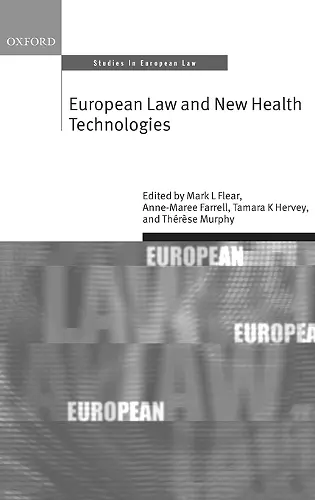European Law and New Health Technologies
Anne-Maree Farrell editor Tamara K Hervey editor Thérèse Murphy editor Mark L Flear editor
Format:Hardback
Publisher:Oxford University Press
Published:14th Mar '13
Currently unavailable, and unfortunately no date known when it will be back

Health is a matter of fundamental importance in European societies, both as a human right in itself, and as a factor in a productive workforce and therefore a healthy economy. New health technologies promise improved quality of life for patients suffering from a range of diseases, and the potential for the prevention of incidence of disease in the future. At the same time, new health technologies pose significant challenges for governments, particularly in relation to ensuring the technologies are safe, effective, and provide appropriate value for (public) money. To guard against the possible dangers arising from new health technologies, and to maximize the benefits, all European governments regulate their development, marketing, and public financing. In addition, several international institutions operating at European level, in particular the European Union, the Council of Europe, and the European Patent Office, have become involved in the regulation of new health technologies. They have done so both through traditional 'command and control' legal measures, and through other regulatory mechanisms, including guidelines, soft law, 'steering' through redistribution of resources, and private or quasi-private regulation. This collection analyses European law and its relationships with new health technologies. It uses interdisciplinary insights, particularly from law but also drawing on regulation theory, and science and technology studies, to shed new light on some of the key defining features of the relationships and especially the roles of risk, rights, ethics, and markets. The collection explores the way in which European law's engagement with new health technologies is to be legitimized, and discusses the implications for biological or biomedical citizenship.
This book is novel in focusing on the European regulatory environment pertaining to NHTs...The aim [of the 1st part of the book] appears to be rather to broaden the reader's horizons so as to be able to see the wider picture. Chapter 2 for example does this brilliantly, providing a sound overview of the potential influences of EU law on NHTs... Present[s] a number of well-selected examples of contemporary problems with European regulation of NHTs. Such examples are thought-provoking and serve to highlight the need for constant regulatory vigilance and willingness to reform in this area...Even a reader with familiarity of some or many aspects of NHT regulation will find something new and instructive in the various topics that have been chosen. The central topic of this book extremely relevant given the upcoming revision of the data protection directive and the medical device directives proposed by the European Commission. * Quinn, Common Market Law Review *
This is an excellent collection that provides a rich overview of the ways in which European law shapes, and is shaped by, new health technologies and, arguably, offers a first step towards the constitution of the European Law of new health technologies as an emerging field of inquiry. Bringing together a vast range of technological developments, of disciplinary insights, and of conceptual questions, this will become a key resource for any scholar seeking to explore the relationship between health technologies and European law and policy, but also for those more broadly interested in the interface between law and technoscience. * E. Cloatre, Kent Law School *
ISBN: 9780199659210
Dimensions: 240mm x 162mm x 36mm
Weight: 860g
478 pages